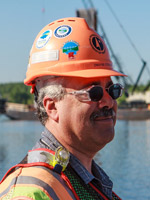
Practical Implementation of Green Infrastructure Strategies
About the Webinar
This webinar featured a presentation on the practical implementation of green infrastructure strategies by John Gulliver from the Department of Civil, Environmental and Geo- Engineering at the University of Minnesota. In the presentation, Gulliver reviewed the many positive attributes of green infrastructure. He also discussed how to overcome the challenges it can present for stormwater management, including infiltration practices, filtration practices, and stormwater ponds.
Following the presentation, a panel of local and state government representatives discussed lessons learned from green infrastructure projects that have been implemented in the areas of design, operations, and maintenance. It also included state guidance.
This webinar was held in conjunction with a joint meeting of the CTS Transportation Infrastructure Council and the CTS Environment and Energy in Transportation Council.
Webinar Materials
- Watch the recording
- Gulliver's presentation slides (PDF)
- Maloney's presentation slides (PDF)
- Stenlund's presentation slides (PDF)
Presenter

John Gulliver is a professor of Civil, Environmental and Geo- Engineering at the University of Minnesota, performing his research at the St. Anthony Falls Laboratory. Much of Dr. Gulliver’s research, in conjunction with other faculty, involves the development of new technology for the treatment of road runoff and assessment of field performance of stormwater treatment practices, including the SAFL Baffle, the Iron-Enhanced Sand Filter, and the MPD Infiltrometer. He is a co-author of the book, Optimizing Stormwater Treatment Practices: A Handbook of Assessment and Maintenance, published by Springer.
Panelists


Ross Bintner is a division manager for the City of Edina Engineering Department. His division plans and manages utility and water resource projects and provides right-of-way management, utility coordination, permitting, and internal support services. Ross has been practicing in city and consulting roles on municipal, transportation, and water resources projects for 20 years. He graduated from Michigan Technological University with a B.S. in civil engineering, is an active member of the MN-APWA, and currently serves on the Minnesota Stormwater Research Council.
Mark Maloney is in his twenty-sixth year as director of public works for the City of Shoreview. He has, since 1994, directed all public infrastructure planning, design, construction, maintenance, and asset management functions for the city. His 31-person department is responsible for the production and delivery of drinking water, sanitary sewer, street lighting, and surface water management services, as well as the oversight of residential street reconstruction, curbside recycling, fleet management, and urban forestry programs. Mark is responsible for the development and management of a budget that averages $17 million annually for construction and operational activities. Shoreview’s Public Works Department is recognized for its pragmatic leadership and creative approaches to solving infrastructure challenges, and its operation and capital project activities are continually rated high in community surveys.


Dwayne Stenlund is a certified professional in erosion and sediment control and holds an adjunct teaching position at the University of Minnesota in the Department of Biosystems and Agricultural Engineering. He has worked in this capacity for MnDOT for more than 24 years and is involved with design, construction, and maintenance using ecologically and sustainable-based technologies to solve difficult soil and storm water quality problems.
Mike Trojan is a hydrologist with the Minnesota Pollution Control Agency's Stormwater program. His primary responsibility is maintaining, updating, and disseminating information in the Minnesota Stormwater Manual.